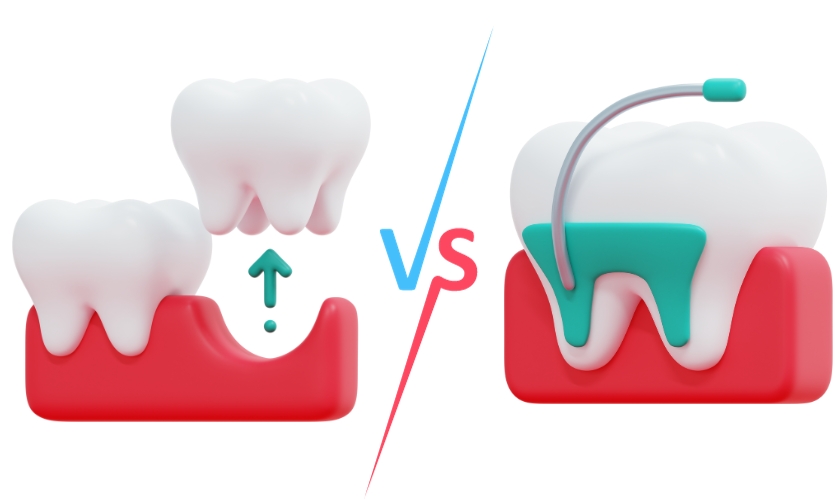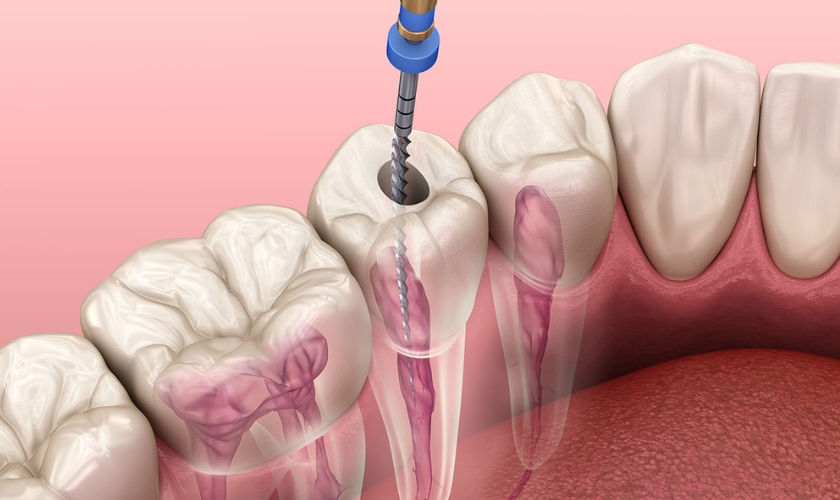Kentwood, MI

Tooth Extraction vs. Root Canal: Which Is Right for You?

Maintaining good oral health is a priority for everyone, but sometimes dental problems arise that require more than just regular check-ups. Two common procedures that are often considered are tooth extraction and root canals. Each has its unique benefits and drawbacks, and the choice between them depends on various factors. In this comprehensive guide, we’ll explore both options in detail to help you make an informed decision about the best treatment for your specific dental issue.
What Is Tooth Extraction?
Tooth extraction is the removal of a tooth from its socket in the jawbone. This procedure is typically done by a dentist or oral surgeon and can involve the extraction of a single tooth or multiple teeth.
When Is Tooth Extraction Necessary?
Tooth extraction is recommended in several situations:
- Severe Tooth Decay: When a tooth is extensively decayed and cannot be restored with a filling or crown, extraction might be the only option.
- Advanced Gum Disease: In cases of advanced periodontal disease, teeth may become loose and need to be extracted.
- Impacted Wisdom Teeth: Wisdom teeth that do not erupt properly can cause pain, infection, and damage to adjacent teeth.
- Orthodontic Treatment: In some cases, tooth extraction is necessary to create space for orthodontic treatment.
- Trauma: Teeth that have been severely damaged due to accidents may need to be extracted.
Pros of Tooth Extraction
- Immediate Relief: Tooth extraction can provide quick relief from pain and discomfort caused by severe dental issues.
- No Future Problems: Extracting a problematic tooth eliminates the possibility of future dental problems related to that tooth.
- Simple Procedure: Tooth extraction is a relatively straightforward and common dental procedure.
What Is a Root Canal?
A root canal, also known as endodontic therapy, is a dental procedure that involves removing infected or damaged pulp from the interior of a tooth. The tooth is then cleaned, disinfected, and sealed.
When Is a Root Canal Necessary?
A root canal is recommended when:
- There is an infection or abscess within the tooth.
- The pulp inside the tooth is inflamed or damaged.
- There’s significant decay that cannot be treated with a filling.
Pros of Root Canals
- Preservation of Natural Tooth: The primary advantage of a root canal is that it allows you to keep your natural tooth, which is often the best option for long-term oral health.
- Pain Relief: Root canals alleviate pain and discomfort caused by infections or damage inside the tooth.
- Aesthetic Benefits: Since your natural tooth is retained, there are no gaps in your smile.
Comparing Tooth Extraction and Root Canals
Pain and Discomfort
- Tooth Extraction: The extraction procedure is relatively quick, and the discomfort is often manageable with over-the-counter pain relievers.
- Root Canal: Root canals may take longer and involve more appointments, but they are generally not as painful as the reputation suggests. The pain is manageable and controlled with anesthesia.
Preservation of Natural Teeth
- Tooth Extraction: The tooth is removed, so there’s no preservation of your natural tooth.
- Root Canal: The natural tooth is preserved, which is a significant benefit for long-term oral health and aesthetics.
Cost Considerations
- Tooth Extraction: Tooth extraction is generally less expensive than a root canal. However, you may incur costs for tooth replacement options like dental implants or bridges.
- Root Canal: While root canals can be more costly, they are often covered by dental insurance, making them more financially feasible for many patients.
Healing and Recovery
- Tooth Extraction: Recovery from a tooth extraction is usually quicker and involves less post-operative care.
- Root Canal: Recovery from a root canal might take a little longer, and you may need to avoid chewing on the treated tooth for a few days.
Long-Term Oral Health
- Tooth Extraction: When a tooth is extracted, it’s gone for good, which can lead to long-term issues like shifting of adjacent teeth.
- Root Canal: Root canals preserve the natural tooth, ensuring better long-term oral health and preventing adjacent teeth from shifting.
Making Your Decision
Consult with a Dentist
The most crucial step in making the right decision between tooth extraction and a root canal is to consult with your dentist. They will examine your oral health, discuss your options, and provide recommendations based on your specific case.
Consider Your Health and Lifestyle
Consider your overall health and lifestyle when making this decision. If you value keeping your natural teeth and are committed to post-operative care, a root canal may be the better option. If you are looking for a quicker solution with less expense, a tooth extraction might be the way to go.
Evaluate the Cost
Your financial situation is a significant factor. While a root canal may have a higher initial cost, it’s often more cost-effective in the long run due to its preservation of your natural teeth. Check with your dental insurance provider to understand what is covered.
FAQs About Tooth Extraction and Root Canals
Can I choose between tooth extraction and a root canal?
Yes, in most cases, you can choose between the two options after discussing with your dentist. They will provide recommendations based on your specific dental issue and overall health.
Are root canals painful?
Root canals are often associated with pain, but with modern anesthesia and techniques, the procedure is generally not as painful as it once was. Discomfort can be managed with pain relievers.
How long does it take to recover from a tooth extraction?
Recovery from a tooth extraction typically takes a few days to a week. Your dentist will provide post-operative care instructions to ensure a smooth recovery.
Can I eat normally after a root canal?
You might need to avoid chewing on the treated tooth for a few days after a root canal. Your dentist will provide dietary restrictions during your recovery period.
Do I need a crown after a root canal?
In many cases, a tooth that has had a root canal will require a crown. The crown provides additional support and protection to the treated tooth.
Your oral health is a critical component of your overall well-being. When faced with a dental issue, it’s essential to make an informed decision about whether to opt for tooth extraction or a root canal.
The choice between tooth extraction and a root canal can have a lasting impact on your oral health, aesthetics, and comfort. Consult with your dentist, consider your health and lifestyle, and evaluate the costs to make the right choice.
Take Action for a Healthy Smile
Whether you choose a tooth extraction or a root canal, taking action to address dental issues promptly is vital. Delaying treatment can lead to more significant problems and increased costs in the future. Prioritize your dental health for a confident and healthy smile. Schedule a consultation with your dentist today to discuss your dental concerns and determine the best course of action for your specific situation.






